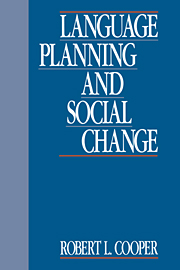Book contents
1 - Four examples in search of a definition
Published online by Cambridge University Press: 06 January 2010
Summary
This chapter provides four defining examples of language planning, found at different times, in different places, and addressed to different problems, both overt and covert. The selection of the four defining examples has undoubtedly been influenced by my own prejudices and personal interests. Nonetheless, these cases form a heterogeneous set which any satisfactory definition of language planning must encompass.
Founding the Académie française
Inasmuch as the work of language academies offers a conspicuous instance of language planning, it is appropriate that one of my defining examples concerns the most eminent of the language academies, the Académie française. The Académie française is not the oldest language academy in the world, nor is it the first to be founded even in France. But of the world's language academies it is the best known and the most consistently respected. Election to membership in this august body, limited to forty at any one time, has long been the supreme tribute to a French writer or scholar. Since its inception in 1634, most of the greatest French writers, with some egregious exceptions such as Molière, have been elected.
The founding of the Academy provides an excellent illustration of the principle that language planning cannot be understood without reference to its social context. When Armand-Jean du Plessis, Cardinal de Richelieu, came to power as first minister to Louis XIII in 1624, France was in danger of disintegration.
- Type
- Chapter
- Information
- Language Planning and Social Change , pp. 3 - 28Publisher: Cambridge University PressPrint publication year: 1990



